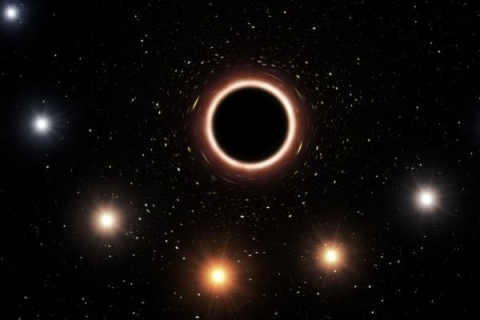

Professor Genzel won the Nobel Prize for ground-breaking research into black holes
19 February 2021
2 min read
The University of Portsmouth was honoured to host a special guest colloquium by 2020 Physics Nobel Laureate, Professor Reinhard Genzel on Thursday 4 March 2021.
Professor Genzel, from the Max-Planck Institute for extraterrestrial Physics in Germany, won the Nobel Prize, along with Roger Penrose and Andrea Ghez, for ground-breaking research into black holes.
During his talk, Professor Genzel discussed the 40-year journey he and his colleagues undertook to study the supermassive Black Hole in the Centre of our Milky Way from ever more precise, long-term studies of the motions of gas and stars as test particles of the space-time. These studies, which showed the existence of a four million solar mass object that must be a single massive black hole, helped to reveal “the darkest secrets of the universe”.

This event is a great opportunity for our young researchers and those interested in the mysteries of our Universe to hear from one of the world’s most distinguished scientific minds.
Claudia Maraston, Professor of Astrophysics
Claudia Maraston, Professor of Astrophysics has organised the colloquium. She said: “I am extremely honoured to be hosting this event with Professor Genzel.
“I first met Professor Reinhard Genzel, back in 2001, when I was a Research Fellow at the Max-Planck Institute. What immediately impressed me was his full engagement in science, his vivid mind and his never satisfied curiosity towards new phenomena and questions. Reinhard would attend talks from young fellows devoting them full attention and would be eager to spend time discussing with young and less young scientists.
“This event is a great opportunity for our young researchers and those interested in the mysteries of our Universe to hear from one of the world’s most distinguished scientific minds.”
I have been following this project with admiration for more than 20 years now. This measurement provides us with an opportunity very rare in astronomy. We watch objects move in real time - albeit over a time span of two decades – and what an exciting sight it is to witness stars swirl around a massive black hole in the centre of our Galaxy.
Professor Daniel Thomas, Head of the School of Mathematics and Physics
Professor Daniel Thomas, Head of the School of Mathematics and Physics, said: "I have been following this project with admiration for more than 20 years now. This measurement provides us with an opportunity very rare in astronomy. We watch objects move in real time - albeit over a time span of two decades – and what an exciting sight it is to witness stars swirl around a massive black hole in the centre of our Galaxy.”
The one-hour lecture was hosted by the School of Mathematics and Physics in the Faculty of Technology and started at 2.30pm. It was followed by a 30-minute question and answer session.
